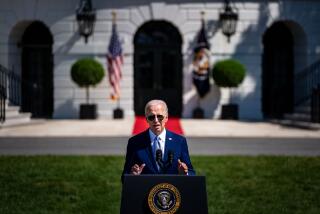Senate Narrowly Defeats Move to Slash Dairy Subsidies : Reinforces House, Votes 50-47 to Kill Administration-Backed Effort to Cut $600 Million
- Share via
WASHINGTON — The Senate Tuesday narrowly defeated an Administration-backed effort to slash dairy subsidies, reinforcing a similar House decision to ward off deep cuts in the multibillion-dollar program.
By a 50-47 vote, the Senate killed an amendment by Sen. Paula Hawkins (R-Fla.) that would have trimmed an estimated $600 million from a pending farm bill in the next three years.
Opponents complained that, in the words of Sen. Patrick J. Leahy (D-Vt.), the amendment would “force farmers into bankruptcy and increase the strain on farm lenders” amid the worst farm crisis in 50 years.
The action dealt a blow to Administration officials and Senate Republican leaders who are seeking spending cuts and policy changes that would avert a veto of the huge farm measure by President Reagan. The legislation, a version of which was approved by the House last month, would reauthorize a wide range of crop price supports, farmer income subsidies and other agriculture programs.
Senate Majority Leader Bob Dole (R-Kan.) said he was told by Budget Director James C. Miller III that the Senate bill was $30 billion over its $35-billion budget target. But because “the farm crisis has worsened” since the target was set, Dole related, the Administration would demand only $15 billion in trims if key policy changes were made.
Republican and Democratic leaders have offered rival amendments to cut about $8 billion from the bill, and fierce controversy has centered on whether to cut income subsidies for wheat, corn, cotton and rice farmers.
However, action on the proposals has been stalled for three weeks by partisan maneuvers related to next year’s congressional elections, when Democrats hope to recapture control of the Senate.
Dole made a bizarre proposal Tuesday for breaking the impasse, but it was quickly shot down by Democrats at a luncheon caucus. The Kansas Republican suggested that the Senate approve a “multiple-choice” bill that included the GOP-Administration plan for reducing income subsidies after one year, as well as the Democratic plan for maintaining the subsidies for four years.
Recorded Votes Sought
Dole said Senate and House negotiators then could decide what to do about the subsidies--and other thorny issues--at a conference called to work out differences in the chambers’ two bills.
But Senate Democrats rejected Dole’s gambit, for substantive and partisan political reasons. Politically, the Democrats hope to force Republicans into recorded votes on the subsidy issue so that those votes can possibly be used against them in election campaigns next year.
Sen. Edward Zorinsky of Nebraska, a former Republican who is now top-ranking Democrat on the Senate Agriculture Committee, said he is furious that his Democratic colleagues rejected Dole’s idea.
“It’s pretty obvious--a partisan attitude is being maintained,” he told reporters. “I’m more concerned about farmers instead of how many seats will be won next year. . . . The farmers of this country are going to think the whole Congress is a bunch of bozos who can’t deal with any farm bill. . . . The entire Senate is at stake, and chairmanships are at stake next year, and I think that system stinks.”
Later, in a floor speech, Dole echoed Zorinsky’s complaint. “My farmers don’t care how many seats are involved in 1986,” said Dole, whose party will have 22 senators facing reelection, while Democrats will have 12.
Despite the rejection of amendments trimming dairy subsidies, the Senate and House bills still call for about $600 million in cuts--half those sought by Reagan. Moreover, the Administration strongly objects to a House-passed “diversion” program that would tax all dairy farmers to pay some to cut production.
In offering her amendment, Hawkins said the dairy program--under which the government purchases surplus milk, cheese and butter--had cost taxpayers $9 billion since 1980, contrasted with only $5 billion in the previous 31 years.
Sen. Pete Wilson (R-Calif.) voted for the amendment, while Sen. Alan Cranston (D-Calif.) voted against it. Cranston, however, said he supports the GOP-Administration plan for cutting wheat, corn, cotton and rice income subsidies.
More to Read
Get the L.A. Times Politics newsletter
Deeply reported insights into legislation, politics and policy from Sacramento, Washington and beyond. In your inbox twice per week.
You may occasionally receive promotional content from the Los Angeles Times.










